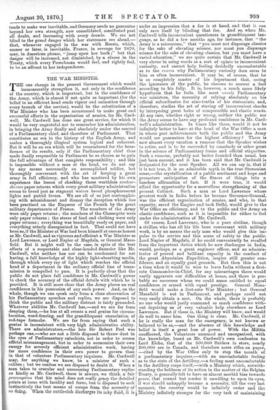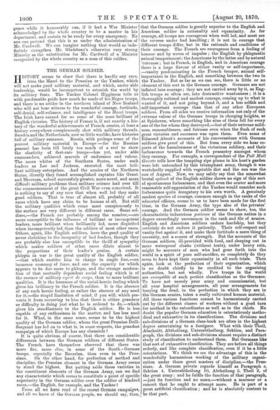THE WAR MINISTER.
THE one change in the present Government which would immeasurably strengthen it, not only in the confidence of the country, which is important, but in the confidence of the Army, which is almost if not quite as important (for the belief in an efficient head sends -vigour and animation through every branch of the service), would be the substitution of a War Minister who has been accustomed to make great and successful efforts in the organization of armies, for Mr. Card- well. Mr. Cardwell has done one great service, for which it would be very ungrateful not to remember his administration, in bringing the Army finally and absolutely under the control of a Parliamentary chief, and therefore of Parliament. That constitutes an era in the history of the English Army, and makes a thoroughly illogical system logical and coherent. But it will be an era which will be remembered for the bene- ficence of its results, only if the Parliamentary chief thus made finally responsible to Parliament be so chosen as to gain the full advantage of that complete responsibility ; and this is impossible without a man at the head, we do not say by any means necessarily an accomplished soldier, but thoroughly conversant with the art of keeping a great army in full efficiency, and who has mastered by his own experience the lesson of checking those worthless couleur- de-rose paper returns which every great military administration seems to breed just as stagnant waters breed phosphorescent lights and putrid fevers. We are all of us just contemplat- ing with astonishment and dismay the deception which has been practised on the Emperor of the French by the great military departments of France. The numbers of the Army were only paper returns ; the numbers of the Chassepots were only paper returns ; the stores of food and clothing were only paper returns ; everything was beautifully ready on paper, and everything utterly disorganized in fact. That could not have been so, if the Minister at War had been himself at once as honest as Mr. Cardwell, and as vigorous and efficient a War Minister as Lord Lawrence, or Lord Napier of Magdala, or General Mans- field. But it might well be the case, in spite of the best efforts of a respectable and clear-headed financier like Mr. Cardwell, who neither has nor can be condemned for not having, a full knowledge of the highly light-absorbing media, through which every ray of light which reaches the official head of a department in the ordinary official line of trans- mission is compelled to pass. It is perfectly clear that the public do not place full confidence in Mr. Cardwell's power to check the accuracy of the official details with which he is provided. It is still more clear that the Army places no real confidence in his possession of any such power. And, on the whole, though we can speak only from a close observation of his Parliamentary speeches and replies, we are disposed to think the public and the military distrust is fairly grounded. Whatever abilities Mr. Cardwell has,—and we are far from denying them,—he has at all events a real genius for circum- locution, word-fencing, and the grandiloquent enunciation of red-tape formula. We are far from saying that such a genius is inconsistent with very high administrative ability. There are administrators,—the late Sir Robert Peel was perhaps one,—who are not a little disposed to throw dust in the eyes of Parliamentary catechists, not in order to screen official mismanagement, but in order to economize their own energy for severely efficient administrative work, having far more confidence in their own power to govern than in that of volunteer Parliamentary inquirers. Mr. Cardwell may, for anything we know, be a minister of such a calibre ; but we confess we are disposed to doubt it. When a man takes to oracular and unmeaning Parliamentary replies as kindly as Mr. Cardwell, there is always, we think, a fair presumption that his mind does not really grasp the detailed points at issue with lucidity and force, but is disposed to seek instinctively the best means of escape from the necessity of so doing. When the cattle-fish discharges its inky fluid, it is under an impression that a foe is at hand, and that it can only save itself by blinding that foe. And so, when Mr. Cardwell tells inconvenient questioners in grandiloquent lan- guage, as he did a few months ago, for instance, that " the Army is a microcosm," that "you must not disparage classics for the sake of elevating science, nor must you disparage science for the sake of elevating classics, but you must have a varied education," we are quite certain that Mr. Cardwell is very clever in using words as a sort of opiate to inconvenient curiosity, and cannot help feeling decidedly uncomfortable as to the reason why Parliamentary curiosity does seem to him so often inconvenient. It may be, of course, that he is so completely master of his department that, seeing the ignorance of the public, he chooses to answer a fool according to his folly. It is, however, a much more likely hypothesis that he feels, like most merely Parliamentary war ministers, the necessity of relying absolutely on his official subordinates for nine-tenths of his statements, and, therefore, studies the art of staving off inconvenient shocks by interposing great bales of compressible and elastic words. At any rate, whether right or wrong, neither the public nor the Army seems to have any profound confidence in Mr. Card- well's administration. In times like these, would it not be infinitely better to have at the head of the War Office a man in whose past achievements both the public and the Army would see guarantees for the highest efficiency ? There is now almost every vacation a rumour that the Speaker wishes to retire, and is to be succeeded by somebody or other great in the science of Parliamentary forms and official etiquettes. Such a rumour, probably not better founded than usual, has just been current, and it has been said that Mr. Cardwell is designated for the next Speaker. All we can say is, that if it is not true, it is an admirable myth in the true Straussian sense,—the crystallization of a public sentiment and hope and premature anticipation of the fitness of things into a baseless affirmation of fact. If it were true, it would afford the opportunity for a marvellous strengthening of the present Cabinet. Such a man as Lord Lawrence whose greatest work in India before he became Governor-General, was the efficient organization of armies, and who, in that capacity, saved the Empire and took Delhi, would give to the War Office an efficiency, and to the public and the Army an elastic confidence, such as it is impossible for either to feel under the administration of Mr. Cardwell.
Of course, Lord Lawrence, who is a pure civilian, though a civilian who has all his life been conversant with military work, is by no means the only man who would give this im- pulse to the service and this sense of safety to the public. Lord Napier of Magdala, if he could conveniently be recalled from the important duties which he now discharges in India, would, perhaps, as a great engineer officer, and an adminis- trator of proved and brilliant capacity in the conduct of the great Abyssinian Expedition, inspire still greater con- fidence, and on equally good grounds. But then this is not a time when it would be wise to leave India without a first- rate Commander-in-Chief, for any miscarriages there would vastly aggravate our difficulties at home, and there is pro- bably no successor whom we could name entitled to equal confidence or armed with equal prestige. General Mans- field would make a first-rate War Minister ; but General Mansfield is not in Parliament, and perhaps could not very easily obtain a seat. On the whole, there is probably no one who would justly command so much confidence with- out depriving us of very valuable help elsewhere as Lord Lawrence. But if there is, the Ministry will know, and would do well to name him. One thing is clear. Mr. Cardwell, if he is really the man for the emergency, is not known or believed to be so,—and the absence of this knowledge and belief is itself a great loss of power. With the Militia unofficered, the Volunteers unarmed and unorganized, with the knowledge, based on Mr. Cardwell's own confession to Lord Elcho, that of the 300,000 Sniders in store, nearly 200,000 are in Canada, and therefore mere rifles on paper, —cited by the War Office only to stop the mouth of a parliamentary inquirer,—with an uncomfortable feeling as to the state of the Artillery,—a feeling most uncomfortable in the Artillery corps itself,—with a Ministry which, notwith- standing the boldness of its action in the matter of the Belgian Treaty, is generally felt to have an almost morbid bias towards peace, that cannot but render it unwilling to open its eyes, if war should unhappily become a necessity, till the very last moment, the country would be infinitely easier and the Ministry infinitely stronger for the very task of maintaining
peace while it honourably can, if it had a War Minister acknowledged by the whole country to be a master in his department, and certain to be ready for every emergency. No one can pretend that this is so under the administration of Mr. Cardwell. We can imagine nothing that would so inde- finitely strengthen Mr. Gladstone's otherwise very strong Ministry as the substitution for Mr. Cardwell of a Minister recognized by the whole country as a man of this calibre.































 Previous page
Previous page